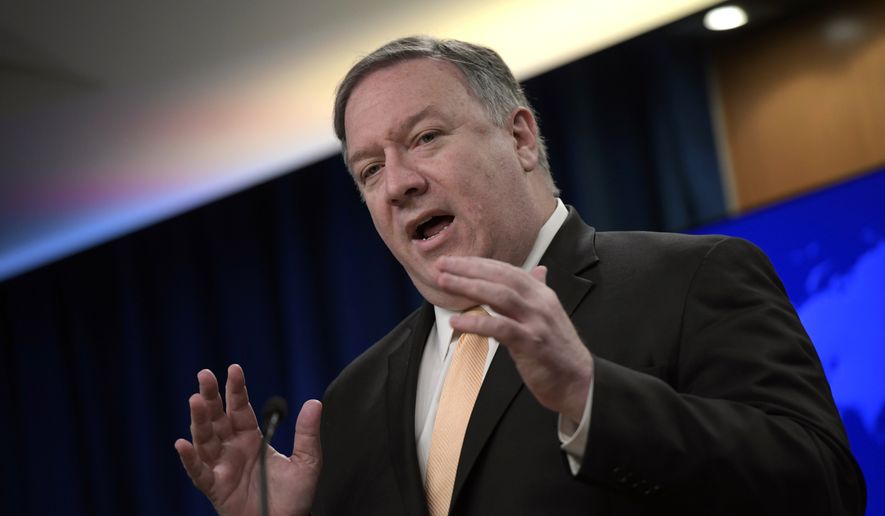The Trump administration announced Monday that all countries buying Iranian oil, including China, Turkey and India, will face U.S. sanctions after May 2 as President Trump intensifies pressure on Tehran at the risk of roiling global oil markets.
Mr. Trump decided that the U.S. will not renew waivers for the five countries still buying oil from Iran when their exemptions expire next week, paving the way for penalties. Administration officials say they want to eliminate a major source of Iran’s cash for supporting Islamist extremist groups and to force Iran back to the nuclear bargaining table.
“We will no longer grant any exemptions,” Secretary of State Mike Pompeo said. “We’re going to zero across the board. Our goal has been to get countries to cease importing Iranian oil altogether.”
U.S. allies Japan and South Korea also buy oil from Iran, although analysts said they have been reducing their imports in anticipation of the administration’s move.
Iran exports at least 1 million barrels of oil per day, the State Department said. Tanker tracking services suggested the true level in March was about 1.9 million barrels, said Atlantic Council analyst Ellen Wall. She said there are “significant questions” about whether other major oil producers such as Saudi Arabia can make up the difference.
U.S. oil prices rose nearly 3% Monday to $65.70 a barrel. Brent crude, the global benchmark, also climbed nearly 3% and hit $74 per barrel for the first time since November.
SEE ALSO: Donald Trump end to Iran oil waivers threatens to energy markets
The average price of gasoline in the U.S. rose to $2.82 per gallon last week, its highest level since October. That was up 56 cents a gallon since the end of 2018 and near its highest level in five years.
Mr. Trump said in a Twitter post on Monday that Saudi Arabia and other OPEC nations “will more than make up the Oil Flow difference in our now Full Sanctions on Iranian Oil.”
The president suggested that former Secretary of State John F. Kerry, who has met with Iranian leaders over the Obama administration’s nuclear deal that Mr. Trump killed, may have violated a federal law that bans private citizens from negotiating with foreign governments without permission from the U.S.
“Iran is being given VERY BAD advice by @JohnKerry and people who helped him lead the U.S. into the very bad Iran Nuclear Deal. Big violation of Logan Act?” Mr. Trump tweeted.
Mr. Pompeo said the U.S. has had “extensive and productive discussions” with Saudi Arabia, the United Arab Emirates and other major oil producers “to ease this transition and ensure sufficient supply.” He said their cooperation, plus increasing U.S. production, “underscores our confidence that energy markets will remain well supplied.”
The administration imposed sanctions on Iran’s oil sector in the fall, pressuring other countries to stop importing oil from Tehran. The State Department granted waivers to eight countries, three of which have stopped buying Iranian oil.
“The Trump administration has taken Iran’s oil exports to historic lows, and we are dramatically accelerating our pressure campaign in a calibrated way that meets our national security objectives while maintaining well-supplied global oil markets,” Mr. Pompeo said.
White House press secretary Sarah Huckabee Sanders said the move “is intended to bring Iran’s oil exports to zero, denying the regime its principal source of revenue.”
The decision is the latest in a series of actions by the administration to crack down on Iran.
It recently moved to designate the Islamic Revolutionary Guard Corps as terrorists. It was the first time the U.S. designated a part of another government as a foreign terrorist organization.
Mr. Trump withdrew last year from the nuclear deal with Iran and six other major powers that the Obama administration had portrayed as the best hope to prevent Tehran from developing weapons of mass destruction.
The administration is making 12 demands that include requiring Iran to give up its right to enrich uranium, stop threatening Israel and halt its support for terrorist groups such as Hamas.
“There are 12 things we’re looking for [from Iran],” Mr. Pompeo said. “When we get to those things, we are happy to re-engage with Iran as a normal nation.”
He said the U.S. is “happy to get the outcome however we can achieve it” and warned Tehran not to test the U.S. militarily.
“We’ve made clear to Iran’s leaders that if Americans are attacked we will respond in a serious way,” he said.
Iran was receiving as much as $50 billion annually from oil exports before the U.S. sanctions, Mr. Pompeo said, adding that the U.S. believes the sanctions have “denied the regime well north of $10 billion.”
He said the length of time Iran goes without oil exports depends on its senior leaders.
“We have made our demands very clear to the ayatollah and his cronies: End your pursuit of nuclear weapons, stop testing and proliferating ballistic missiles, stop sponsoring and committing terrorism, halt the arbitrary detention of U.S. citizens,” Mr. Pompeo said. “Our pressure is aimed at ending these and others, and it will continue to accelerate until Iran is willing to address them at the negotiating table.”
Rep. Michael T. McCaul of Texas, the top Republican on the House Foreign Affairs Committee, praised the president’s decision.
“The Iranian regime, responsible for the deaths of over 600 U.S. troops, continues to wreak havoc in the Middle East, threatening U.S. interests and allies,” Mr. McCaul said. “By reducing Tehran’s financial resources, this policy will further deprive the regime of the cash it uses to fuel its destabilizing activities.”
• Tom Howell Jr. contributed to this article.
• Dave Boyer can be reached at dboyer@washingtontimes.com.
• Lauren Toms can be reached at lmeier@washingtontimes.com.




Please read our comment policy before commenting.